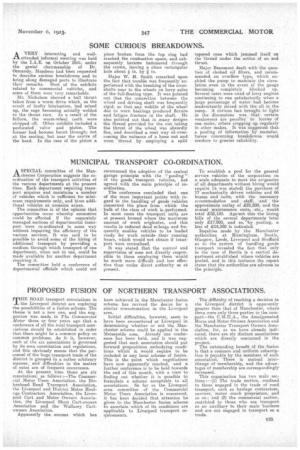MUNICIPAL TRANSPORT CO-ORDINATION.
Page 9

If you've noticed an error in this article please click here to report it so we can fix it.
A SPECIAL committee of the Manrichester Corporation suggests the coordination of the transport activities of the various 'departments at the present time. Each department requiring transport acquires and maintains a number of vehicles which as sufficient, for minimum requirements only, and hires additional vehicles as occasion arises.
The committee is of the opinion that opportunities occur whereby economies could be effected if the separately. managed sections of departmental transport were co-ordinated in some way without impairing the efficiency of the various services. It was said to be possible to avoid some of the hiring of additional transport by providing a medium through which transport of one department, when not in use, could be made available for another department requiring it.
The committee held a conference of departmental officials which could not recommend the adoption _of the central garage principle with the pooling" of the goods transport vehicles, but agreed with the main principle of coordination.
Tire conference concluded that one of the most important points with regard to the handling of goods vehicles concerned the place from which the bulk of the class of Work is performed. In most cases the traesport units are at present housed where the maximum amount of work originates, and this results in reduced dead mileage and frequently enablee vehicles to be loaded ready for work outside their running hours, which would not obtain if transport were centralized.
It was stated that the control and supervision of men not directly responsible to those employing them would be much more difficult and less effective than under direct authority as at present. • To establish a pool for the general service vehicles of the corporation on a scale adequate to meet the exigencies of all departments without hiring would require (it was stated) the purchase of 17 mechanically driven vehicles and 66 horses and carts, with the necessary accommodation and staff, and the approximate outlay of 221,800, and the annual maintenance costs, etc., would total 232,150. Against this the hiring bills of the several departments total only 217,800, and so; Thy pooling, a loss of .214,350 is indicated.
Inquiries made by the Manchester authorities at Birmingham, Bootle, Glasgow, Leeds, Liverpool and Sheffield as to the system of handling goods transport revealed the fact that only in the case of Bootle is a central des pertinent established -where vehicles are pooled, and in this instance the report states that the authorities are adverse to the principle.
































